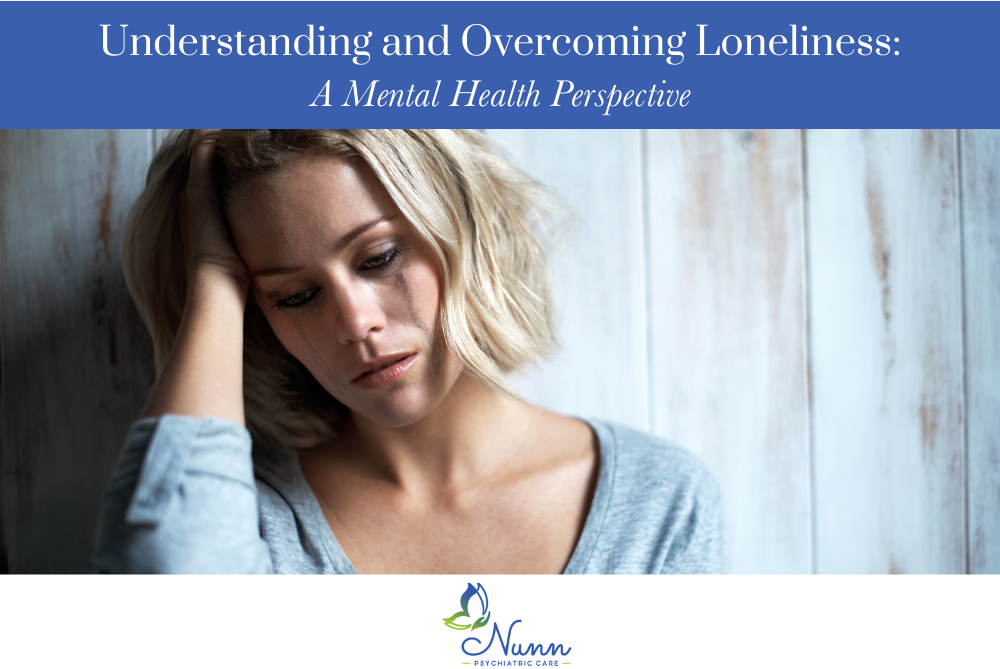In today’s fast-paced, hyper-connected world, it may seem ironic that loneliness is a growing concern affecting millions of people. Whether you’re surrounded by people or living alone, loneliness can creep in unexpectedly and impact your mental, emotional, and even physical health. At Nunn Psychiatric Care, we understand the profound effects of loneliness and are here to offer support, tools, and hope to those struggling with this often invisible condition.
What Is Loneliness?
Loneliness is more than just being alone—it’s a subjective feeling of disconnection. It occurs when there is a gap between the social interaction you want and what you’re experiencing. People of all ages, backgrounds, and walks of life can feel lonely, even when surrounded by others.
Unlike solitude, which can be a healthy and restorative choice, loneliness is often involuntary and can become chronic if not addressed.
The Health Impacts of Loneliness
Loneliness can have serious consequences on mental and physical health. Chronic loneliness has been linked to:
- Depression and anxiety
- Sleep disturbances
- Increased stress levels
- Weakened immune system
- Higher risk of heart disease and stroke
- Cognitive decline in older adults
In fact, research shows that chronic loneliness may be as harmful to your health as smoking 15 cigarettes a day.
Who Is at Risk?
While loneliness can affect anyone, certain groups are more vulnerable:
- Older adults, especially those living alone or in care facilities
- Young adults, who may feel isolated during major life transitions
- Caregivers, who often put others’ needs before their own
- People with chronic illness or disability
- Individuals experiencing grief, loss, or relationship issues
At Nunn Psychiatric Care, we see many patients whose feelings of loneliness are tied to other mental health conditions such as depression, PTSD, or anxiety.
Strategies to Combat Loneliness
Fortunately, loneliness is a treatable condition. Here are a few ways to manage and overcome it:
1. Reach Out for Help
Talking to a mental health professional can help you identify the root causes of your loneliness and work through them with effective strategies. Therapy can offer support, validation, and tools for emotional resilience.
2. Strengthen Existing Connections
Sometimes, reaching out to a friend, family member, or coworker can rekindle important social bonds. A simple conversation can go a long way.
3. Engage in Community Activities
Volunteering, joining a local group, or participating in a hobby-based club can help you meet like-minded individuals and create meaningful connections.
4. Practice Self-Compassion
Be kind to yourself. Loneliness is not a personal failure—it’s a human experience. Acknowledge your feelings without judgment and treat yourself with care.
5. Limit Social Media Use
Ironically, social media can increase feelings of isolation by fostering unrealistic comparisons. Take breaks or set boundaries to focus more on real-world interactions.
Q&A: Frequently Asked Questions About Loneliness
Q: Is loneliness the same as depression?
A: While loneliness and depression often coexist, they are distinct. Loneliness refers to feeling socially disconnected, while depression is a clinical condition that affects mood, thoughts, and physical well-being. However, chronic loneliness can lead to depression if left unaddressed.
Q: Can someone feel lonely even if they have friends and family?
A: Absolutely. Loneliness is about the quality of relationships, not the quantity. If your relationships feel unfulfilling or lack emotional closeness, you may still feel lonely despite having a social circle.
Q: When should I seek professional help for loneliness?
A: If feelings of loneliness persist for weeks or months, interfere with daily functioning, or contribute to symptoms of depression or anxiety, it’s time to reach out for support from a mental health provider.
Q: What treatments are available for chronic loneliness?
A: Treatment can include individual therapy, cognitive behavioral therapy (CBT), support groups, medication (if related to underlying depression or anxiety), and lifestyle interventions such as mindfulness or stress reduction.
Q: Can loneliness affect physical health?
A: Yes. Loneliness is linked to increased risk of cardiovascular issues, weakened immunity, and cognitive decline. Addressing loneliness is essential not just for emotional wellness, but also for long-term physical health.
You Are Not Alone—We’re Here to Help
At Nunn Psychiatric Care, we provide compassionate, individualized mental health services to help you navigate life’s emotional challenges. Whether you’re struggling with loneliness, depression, anxiety, or other concerns, our experienced team is here to listen, support, and guide you toward healing.
If you or a loved one is feeling isolated or overwhelmed, don’t wait. Reach out today.
Contact Us:
Nunn Psychiatric Care
📍 113 Lincoln Dr
📍 Hodgenville, KY 42748
📞 Phone: (270) 358-6221
Take the first step toward connection and healing. Your mental wellness matters—and you don’t have to face it alone.

